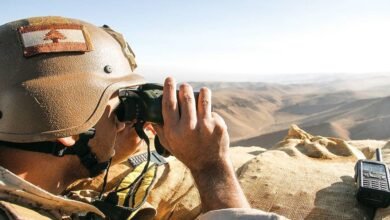Fear in Beirut of the “fifth column”
Naji Charbel wrote in “Al-Anbaa Al-Kuwaiti”:
In Beirut, for fear that the confrontations between the Israeli enemy and Hezbollah will take an escalating path, reaching a complete decline and translating into the intensification of the Israeli strikes, which so far have taken a technological approach, accompanied by military aircraft, marches, and reconnaissance, to carry out assassination operations and target resistance fighters, Palestinian factions, and armed groups, some of which are external. The axis of resistance system, as happened in Al-Habbariyeh.
In Beirut, there is a fear no less important than the expansion of military developments, in terms of the unveiling of additional illegal weapons (even in the ministerial statements of successive governments since the April 1996 understanding following the Israeli “Grapes of Wrath” operation), some of which are close to the opposing axis, such as the weapons of the Islamic Group and some Palestinian factions. While others are listed, as of this writing, as a “fifth column.” This pushes the country into an internal crisis, in light of the declaration by a large segment of a certain sectarian and denominational color (Christians) of not resorting to legitimate weapons outside the scope of the Lebanese state, and this group’s emphasis on the necessity of restricting weapons and the decision of war and peace to the hands of the Lebanese state alone.
The “breakthrough” in the Christian objection, which is still under the roof, came from the incident of the border town of Rmeish in southern Lebanon, in terms of the residents’ refusal to expose their town to Israeli targeting that would lead to the displacement of its people.
Some influential Christian figures were quick to point out, at the special iftar party of the Islamic Orphanage, on the day of the Rmeish incident, that the ringing of the church bell in the town on that day indicated a danger facing it and its people, demanding the protection of coexistence and the preservation of the steadfastness of the people despite their differences. Their political and sectarian affiliations in the border areas.
According to the available information, the leadership of the “Amal” movement, headed by Parliament Speaker Nabih Berri, gave the utmost attention to the issue of the steadfastness of the people in the border villages and towns, stressing the removal of turmoil from the souls. It is looking with keen eyes at the infiltration of groups of Lebanese, some of whom carry visible light weapons, into border areas, and expresses its fear of the presence of intentions from some inside and outside the country to bring about a change in the demographic landscape in the south.
Between illegal weapons and their rejection by the people under the pretext of avoiding exposing their towns and families to danger and displacement, the Lebanese fear that things will go wrong at home, based on previous fatal experiences with the “fifth column,” whose efforts were aimed at relieving pressure on Israel and immersing the Lebanese in complex internal problems. Their solutions seem, yes, intractable!
A fear that is exacerbated with the countdown to the beginning of April, on the thirteenth of which Lebanon recalls the anniversary of the outbreak of the civil war there in 1975, which ended on October 13, 1990, with “a victor and a loser,” and the country is paying the price for this result.
«Socotra, Yemen.. Will it be the new center for American bases?







